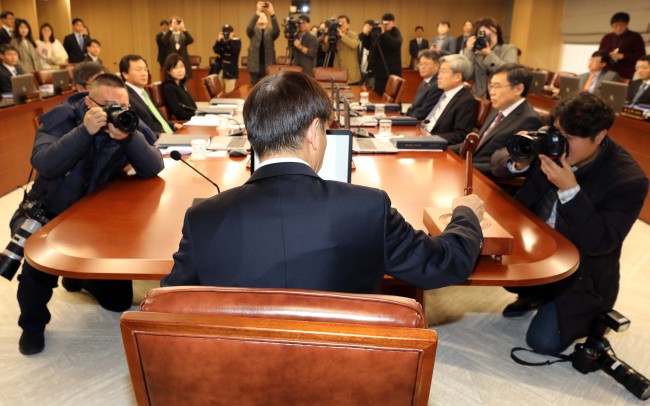Rate differentials have minor impact on foreign bond capital outflow: BOK
By Son Ji-hyoungPublished : Dec. 19, 2018 - 16:51
The interest rate differentials between the United States and South Korea have had a negligible effect on the outflow of foreign capital from the domestic bond market, showed a study by Korea’s central bank on Wednesday.
This finding stood in contrast to widespread views that foreign capital outflow from the Korean financial market would be accelerated if the base rate of the US Federal Reserve were higher than the Bank of Korea.
This finding stood in contrast to widespread views that foreign capital outflow from the Korean financial market would be accelerated if the base rate of the US Federal Reserve were higher than the Bank of Korea.

The study, “Determinants of Capital Flows in the Korean Bond Market,” looked at the capital flow of foreign investors in four categories -- sovereign wealth funds, central banks, private funds and private banks -- on the Korean bond market from January 2008 to December 2017. During that period, the policy rate of the US was 0.75 percentage point higher than that of Korea at its highest.
Only capital outflow from foreign private banks on short-term bonds was significant.
According to Kim Soo-hyon, an economist at BOK’s Economic Research Institute, a 1 percentage point rise in interest rate differentials of one-month bonds and one-year bonds resulted in a 5 percent and 7 percent increase in foreign banks’ capital, respectively. But Kim added this had little effect on total foreign capital outflow, citing the low proportion of capital from foreign private banks -- less than 3 percent.
Rather, the increased foreign currency reserves of the world’s central banks served as “the most impressive factor.” The estimate was based on the total foreign currency reserves of 16 countries and the eurozone, excluding China.
“Foreign currency reserves have started to cross borders more and more, and macroprudential measures to regulate arbitrageurs have stabilized financial markets, with interest rate differentials becoming less significant than ever,” Kim wrote.
By Son Ji-hyoung
(consnow@heraldcorp.com)
Only capital outflow from foreign private banks on short-term bonds was significant.
According to Kim Soo-hyon, an economist at BOK’s Economic Research Institute, a 1 percentage point rise in interest rate differentials of one-month bonds and one-year bonds resulted in a 5 percent and 7 percent increase in foreign banks’ capital, respectively. But Kim added this had little effect on total foreign capital outflow, citing the low proportion of capital from foreign private banks -- less than 3 percent.
Rather, the increased foreign currency reserves of the world’s central banks served as “the most impressive factor.” The estimate was based on the total foreign currency reserves of 16 countries and the eurozone, excluding China.
“Foreign currency reserves have started to cross borders more and more, and macroprudential measures to regulate arbitrageurs have stabilized financial markets, with interest rate differentials becoming less significant than ever,” Kim wrote.
By Son Ji-hyoung
(consnow@heraldcorp.com)







![[Graphic News] More Koreans say they plan long-distance trips this year](http://res.heraldm.com/phpwas/restmb_idxmake.php?idx=644&simg=/content/image/2024/04/17/20240417050828_0.gif&u=)
![[KH Explains] Hyundai's full hybrid edge to pay off amid slow transition to pure EVs](http://res.heraldm.com/phpwas/restmb_idxmake.php?idx=644&simg=/content/image/2024/04/18/20240418050645_0.jpg&u=20240419100350)








![[KH Explains] Hyundai's full hybrid edge to pay off amid slow transition to pure EVs](http://res.heraldm.com/phpwas/restmb_idxmake.php?idx=652&simg=/content/image/2024/04/18/20240418050645_0.jpg&u=20240419100350)

![[Today’s K-pop] Illit drops debut single remix](http://res.heraldm.com/phpwas/restmb_idxmake.php?idx=642&simg=/content/image/2024/04/19/20240419050612_0.jpg&u=)